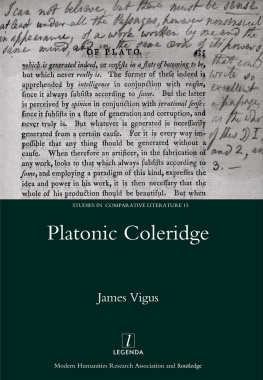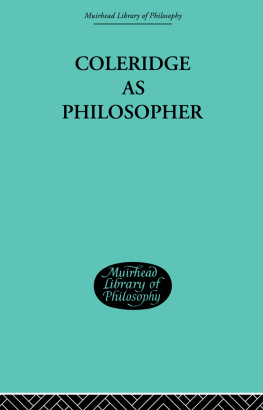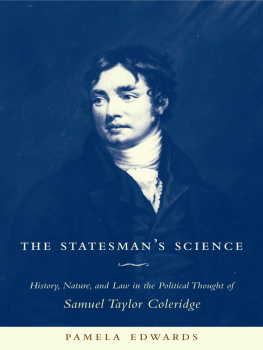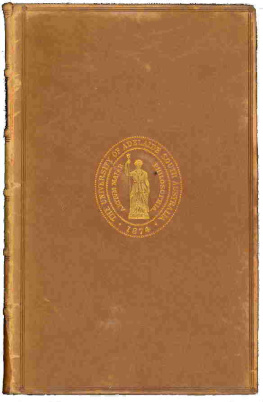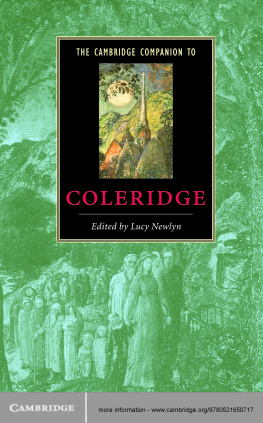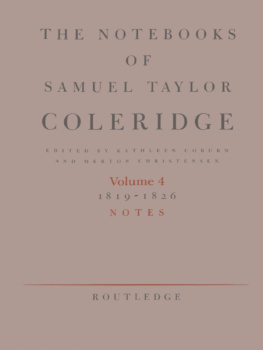Platonic Coleridge
LEGENDA
LEGENDA, founded in 1995 by the European Humanities Research Centre of the University of Oxford, is now a joint imprint of the Modern Humanities Research Association and Routledge. Titles range from medieval texts to contemporary cinema and form a widely comparative view of the modern humanities, including works on Arabic, Catalan, English, French, German, Greek, Italian, Portuguese, Russian, Spanish, and Yiddish literature. An Editorial Board of distinguished academic specialists works in collaboration with leading scholarly bodies such as the Society for French Studies and the British Comparative Literature Association.

The Modern Humanities Research Association (MHRA) encourages and promotes advanced study and research in the field of the modern humanities, especially modern European languages and literature, including English, and also cinema. It also aims to break down the barriers between scholars working in different disciplines and to maintain the unity of humanistic scholarship in the face of increasing specialization. The Association fulfils this purpose primarily through the publication of journals, bibliographies, monographs and other aids to research.
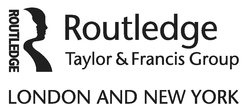
Routledge is a global publisher of academic books, journals and online resources in the humanities and social sciences. Founded in 1836, it has published many of the greatest thinkers and scholars of the last hundred years, including adorno, einstein, Russell, Popper, Wittgenstein, Jung, Bohm, Hayek, Mcluhan, Marcuse and Sartre. Today Routledge is one of the world's leading academic publishers in the Humanities and Social Sciences. It publishes thousands of books and journals each year, serving scholars, instructors, and professional communities worldwide.
www.routledge.com
Editorial Board
Chairman
Professor Martin McLaughlin, Magdalen College, Oxford
Professor John Batchelor, University of Newcastle (English)
Professor Malcolm Cook, University of Exeter (French)
Professor Colin Davis, Royal Holloway University of London
(Modern Literature, Film and Theory)
Professor Robin Fiddian, Wadham College, Oxford (Spanish)
Professor Paul Garner, University of Leeds (Spanish)
Professor Marian Hobson Jeanneret,
Queen Mary University of London (French)
Professor Catriona Kelly, New College, Oxford (Russian)
Professor Martin Maiden, Trinity College, Oxford (Linguistics)
Professor Peter Matthews, St John's College, Cambridge (Linguistics)
Dr Stephen Parkinson, Linacre College, Oxford (Portuguese)
Professor Ritchie Robertson, St John's College, Oxford (German)
Professor Lesley Sharpe, University of Exeter (German)
Professor David Shepherd, University of Sheffield (Russian)
Professor Alison Sinclair, Clare College, Cambridge (Spanish)
Professor David Treece, King's College London (Portuguese)
Professor Diego Zancani, Balliol College, Oxford (Italian)
Managing Editor
Dr Graham Nelson
41 Wellington Square, Oxford OXI 2JF, UK
legenda@mhra.org.uk
www.legenda.mhra.org.uk
Studies in Comparative Literature
Editorial Committee
Professor Peter France, University of Edinburgh (Chairman)
Professor Stephen Bann, University of Bristol
Dr Elinor Shaffer, School of Advanced Study, London
Studies in Comparative Literature are produced in close collaboration with the British Comparative Literature Association, and range widely across comparative and theoretical topics in literary and translation studies, accommodating research at the interface between different artistic media and between the humanities and the sciences.
Published in This Series
- Breeches and Metaphysics: Thackeray's German Discourse , by S. S. Prawer
- Hlderlin and the Dynamics of Translation, by Charlie Louth
- Aeneas Takes the Metro: The Presence of Virgil in Twentieth-Century French Literature , by Fiona Cox
- Metaphor and Materiality: German Literature and the World-View of Science l7801955 , by Peter D. Smith
- Marguerite Yourcenar: Reading the Visual , by Nigel Saint
- Treny: The Laments of Kochanowski , translated by Adam Czerniawski and with an introduction by Donald Davie
- Neither a Borrower: Forging Traditions in French, Chinese and Arabic Poetry, by Richard Serrano
- The Anatomy of Laughter , edited by Toby Garfitt, Edith McMorran and Jane Taylor
- Dilettantism and its Values: From Weimar Classicism to the fin de sicle , by Richard Hibbitt
- The Fantastic in France and Russia in the Nineteenth Century: In Pursuit of Hesitation , by Claire Whitehead
- Singing Poets: Literature and Popular Music in France and Greece , by Dimitris Papanikolaou
- Wanderers Across Language: Exile in Irish and Polish Literature of the Twentieth Century , by Kinga Olszewska
- Moving Scenes: The Aesthetics of German Trauel Writing on England 17831830 , by Alison E. Martin
- Henry James and the Second Empire , by Angus Wrenn
- Platonic Coleridge , by James Vigus
Platonic Coleridge
James Vigus
Studies in Comparative Literature 15
Modern HumModern Humanities Research Association and Routledge
2009
First published 2009
Published by the
Modern Humanities Research Association and Routledge
2 Park Square, Milton Park, Abingdon, Oxon OX14 4RN
711 Third Avenue, New York, NY 10017, USA
LEGENDA is an imprint of the Modern Humanities Research Association and Routledge
Routledge is an imprint of the Taylor & Francis Group, an informa business
Modern Humanities Research Association and Taylor & Francis 2009
ISBN 978-1-906540-06-7 (hbk)
All rights reserved. No part of this publication may be reproduced, stored in a retrieval system, or transmitted in any form or by any means, electronic, mechanical, including photocopying, recordings, fax or otherwise, without the prior written permission of the copyright owner and the publisher.
Product or corporate names may be trademarks or registered trademarks, and are used only for identification and explanation without intent to infringe.
Contents
Guide
FOR CECILIA
This book is a revision of my PhD thesis, completed at Clare College, Cambridge, in 2006. I wish to thank the Arts and Humanities Research Council for funding my research, including a supplementary grant for a four-month research visit to the Freie Universitt, Berlin, which I undertook as an Erasmus student in 2004. I enjoyed further financial support from the Lady Clare Fund (Clare College) and the Tenth Term Completion Award (Faculty of English, Cambridge).
I have been extremely fortunate in the advice I have received throughout the long process of research and writing. I want to begin by thanking my doctoral supervisor, Fred Parker, for his meticulous reading and judicious encouragement ever since the early days of my undergraduate degree at Clare. Thanks too to Douglas Hedley, who has shared his knowledge of Coleridge and Platonism with great generosity. He also arranged my visit to Berlin, which proved a turning point in my research. I thank Nigel Leask for stimulating my interest in Coleridge at an early stage, and for two useful advisory meetings.

